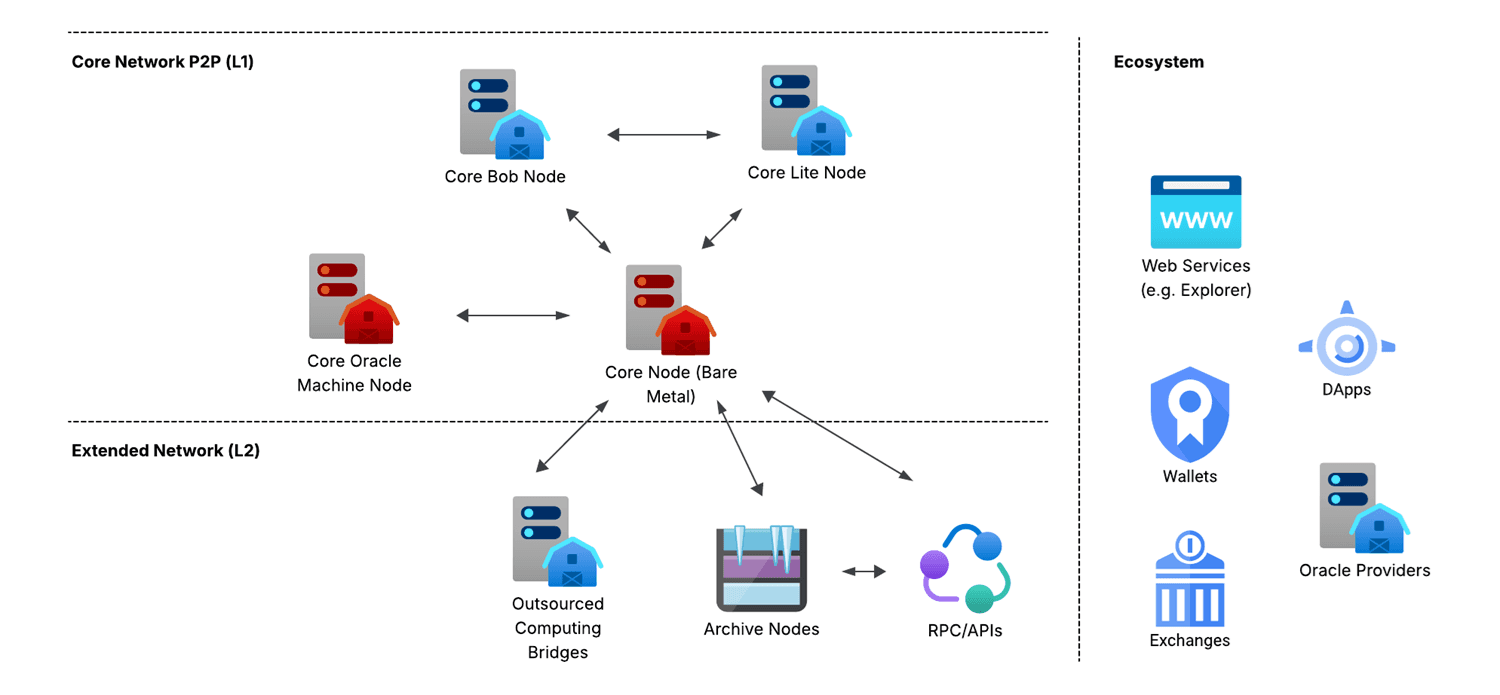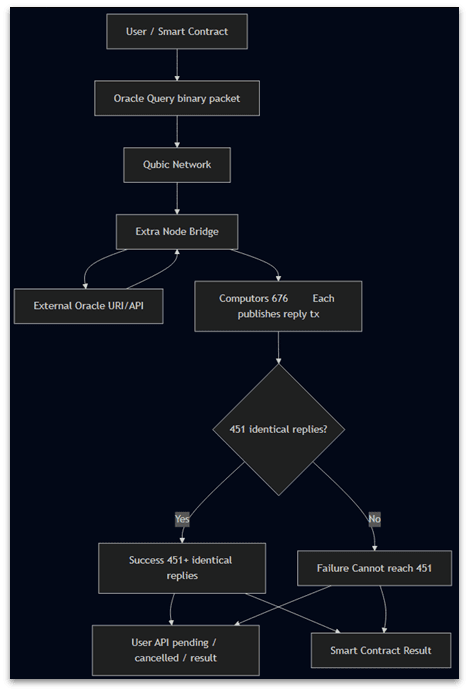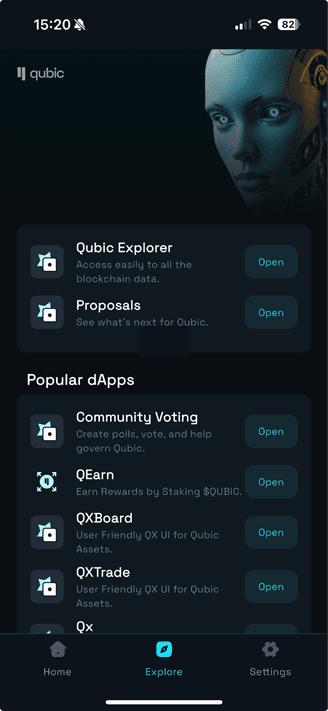
QUBIC BLOG POST
Qubic All-Hands Presentation October, 23 2025 Recap
Written by

The Qubic Team
Published:
Oct 25, 2025

Listen to this blog post

The latest Qubic Community All-Hands revealed a project hitting its stride, detailing major steps in market expansion, scientific advancement, and core infrastructure development. The takeaway is clear: Qubic is aggressively building the foundation for a sustainable, high-performance compute economy.
Market Access: Tier-1 Exchanges and US Debut
The most immediate news focuses on significantly expanding Qubic's liquidity and accessibility, especially in the crucial US market.
Tier-1 Exchange Momentum: Qubic is deep in the listing process with two major Tier-1 exchanges. This includes OKX, which is currently evaluating Qubic for wallet integration (Phase 2).
The US Breakthrough: Crucially, a listing process is actively underway for a US Tier-1 exchange, promising to open up the Qubic market to a vast new audience.
DeFi Expansion: To bolster the ecosystem's utility, the team is drafting an RFP for a Perpetual Decentralized Exchange (DEX), a key step toward enabling advanced DeFi services on Qubic.
Scientific Core: The Fusion of Aigarth and Neuraxon
The Scientific team is focused on enhancing Qubic's unique AI core, the very engine of its compute network.
Next-Gen AI: The team is working on a hybridization of Aigarth and Neuraxon, an effort designed to significantly boost the AI's power and performance.
Precision and Viability: Research is focused on meticulously testing the levels of neuromodulators to achieve maximum accuracy, moving toward proposing the refined, high-efficiency AI model.
Strategic Bridge: Connecting Qubic Compute to Solana Liquidity
A major announcement involves securing Avicenne Studio, the winner of the Solana Bridge RFP, known for its work with protocols like Wormhole.
Proven Builders: Avicenne Studio recently built a Base <> Solana token bridge, establishing them as reliable experts in cross-chain connectivity.
The Growth Lever: The Qubic <> Solana Bridge will be a two-way connection. This is strategically more than a feature; it’s designed to function as a growth lever, directly linking Qubic’s powerful compute capacity to Solana’s massive liquidity and user base.
The team is finalizing the architecture and a detailed roadmap for this critical integration.
Phase | Timeline |
Finalization of the Architecture | Weeks 1–3 |
Smart Contract Development | Weeks 4–10 |
Backend & Bots Development | Weeks 4–14 (parallel) |
Frontend & Operator Interfaces | Weeks 6–11 (parallel) |
External Smart Contract Audit | Weeks 11–13 (parallel) |
Integration & Internal Testing | Weeks 14–16 |
Testnet Deployment & Public Testing | Weeks 16–18 |
IPO Preparation & Governance Approval | Weeks 19–22 |
Mainnet Deployment & Stabilization | Weeks 23–25 |
CoreTech: New Nodes, Roadmap, and Sustainable Economics
The CoreTech team delivered a monumental update, focusing on new node architecture and the design of a sustainable economic model for smart contracts.
The Core Node Revolution
To decentralize and strengthen the network, the team is introducing specialized nodes with lower barriers to entry:
Core Lite Node (Beta): A resource-efficient node that runs on Linux. It's designed for easy integration with business applications and will feature planned auto-deployment, making it simple for businesses to support the network.
Core Bob Node (Beta): An ultra-lightweight, builder-centric node. Running on Linux with AVX2 support, it offers a crucial REST API for developers and is customizable for unique applications.

Critical Infrastructure Updates
Q4 Roadmap Highlights: The team shared a clear plan through the end of the year, including the beta release of the new Lite and Bob Nodes, the launch of Shareholder Voting (V1), the new TX Mempool Live for optimized transactions, and the final design for Smart Contract Execution Fees.
New Transaction Pool: An optimized Pending TX Pool will streamline transaction processing, boosting overall network speed and user experience.
Sustainable Smart Contract Economics
The CoreTech team formalized the design for Smart Contract (SC) execution fees, a vital component for long-term network health:
Paying for Computation: Smart Contracts will now pay a fee for their computation time (including the time used by other SCs they call).
The Economic Loop: The SC charges a user for its function, and then uses that fee to pay the network for the required computation.
Incentivizing Efficiency: This model is crucial because it incentivizes developers to write highly efficient SC code, which naturally translates to higher network speed and lower costs.
Oracle Machines Update
The team's current Development/Design Focus for Oracle Machines is centered on creating a high-quality, practical product:
User Experience: Ensuring the OMs are easy and intuitive to integrate and use.
Low Latency: Designing the system for fast access to real-world data, enabling near real-time reactions for smart contracts.
High Reliability: Reinforcing the system's robust design (which requires 451+ validator consensus) to guarantee the accuracy and trustworthiness of the external data.
Simple Usage: Making the process of querying and consuming oracle data straightforward for both developers and users.
Fee-Based Requests: Oracle requests will be fee-based (described as a donation), which is used to incentivize the Computors (validators) who provide valid replies.
Independent Oracle Providers: The External Oracle Provider (the source of the off-chain data) does not need to know about Qubic internals, maintaining flexibility and independence.
Broad Consumption: The oracle information is consumable by both Users (for manual queries) and Smart Contracts (for automated actions).

Qubic Android App Update (iOS in Review)
The team has provided updates regarding the security and user experience development across the Qubic applications, focusing heavily on the mobile wallets:
Mobile Wallet Security:
The Penetration Test of Mobile Wallets (Android/iOS) has been finished, indicating a crucial security milestone has been met.
A second round of penetration test for the Mobile Wallets (Android/iOS) is scheduled for November 25, demonstrating the team's commitment to rigorous security assurance before full release.
Platform Improvements:
The team is implementing Minor UI/UX improvements to the Explorer and Web Wallet, focusing on enhancing usability and providing a smoother overall experience for users tracking transactions and managing assets.

Overall, the Qubic All-Hands painted a picture of coordinated, rapid development. With strategic market expansion, scientific refinement, and a robust core tech roadmap, Qubic is solidifying its position as a serious contender in the world of decentralized computation.
For more information: